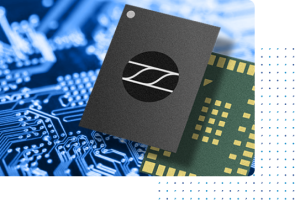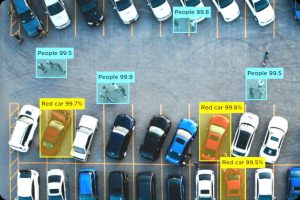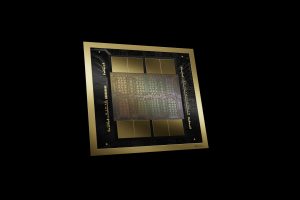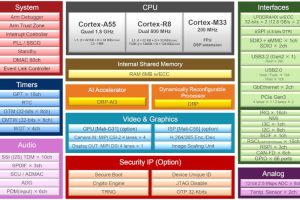Mouser reflected one of the major themes at Embedded World 2024, intelligence at the edge, and announced it has signed Edge Impulse, the software framework provider for embedded machine learning (ML) applications. Machine learning is implemented at the edge of the network, explained Mouser’s Mark Patrick in order to make decisions very quickly at the [network] edge. [Edge Impulse’s] products ...
AI
The support or use of AI (artificial intelligence) in electronics, including ML (machine learning), whether in software (supervised, unsupervised or reinforcement learning tools) or hardware (accelerators, GPUs, etc).
Blackwell proposes “intriguing times”
The introduction of the Blackwell platform generated a lot of interest but also some searching questions. Electronics Weekly spoke to Keith Townsend, global technology advisor for the Futurum Group who reflected on Nvidia‘s announcement of its Blackwell platform and its leap in performance. “These are intriguing times,” he said. The announcement of Blackwell makes for interesting conversation around scale. Blackwell ...
TeraSignal adds photonics IC for scaling AI bandwidth in datacentres
TeraSignal, the photonics specialist, has announced an intelligent re-driver device for scaling AI bandwidth in data centers. The TS8401/02 intelligent 400G (4x100G) PAM4 modulator driver claims to be the industry’s first CMOS IC with digital link training and link monitoring for 800G linear pluggable optical (LPO) modules. “TeraSignal’s intelligent CMOS solution for LPO modules redefines high-speed interconnects, merging low latency and ...
Korean AI startups chase Nvidia
Rebellions and Sapeon are two fabless chip companies in Korea founded to design AI chips. Rebellions Three year-old Rebellions raised $128 million in its recent Series B funding round. The CEO, Sunghyun Park (pictured), worked for Morgan Stanley and Starlink after getting a PhD at MIT. The company is working with Samsung Foundry on the design and packaging of a ...
Nvidia packages inference to deliver generative AI for healthcare
Optimised packages of AI models and workflows with API have been packaged as NIMs (Nvidia Inference Microservices) which developers can use as building blocks to develop generative AI for healthcare, from drug discovery, med-tech and digital health products. Nvidia announced 25 NIMs at its developer conference, GTC 2024, offering advanced imaging, natural language and speech recognition, digital biology generation, prediction ...
Run Nvidia Tao-developed AI vision models on non-Nvidia Arm hardware
Custom vision-based AI software created on Nvidia’s Tao tool set can be run on Arm based Cortex-M, Cortex-A and Ethos-U microcontrollers according to Edge Impulse, which teamed up with Nvidia to create the work-flow. “Engineers can create computer vision models that can be deployed to hardware including NXP I.MXRT1170, Alif E3, STMicro STM32H747AI and Renesas CK-RA8D1,” according to Edge Impulse. ...
Nvidia Blackwell GPU shares Hopper architecture but ramps up performance
As accelerated computing reaches its tipping point, Nvidia’s CEO explained the company’s plan is not to drive down costs but to scale up performance. He was speaking at Nvidia GTC in San Jose, introducing the Blackwell AI superchip. It will democratise trillion parameter AI, promises Huang, to meet the 1.8 trillion parameters computing performance of accelerated computing. In the home ...
80Top/s AI vision and real-time control MCU for industrial robots and machinery
Renesas is aiming at industrial robots with a microcontroller that combines AI vision and real-time control processing. Called RZ/V2H, the ICs include the company’s DRP-AI3 ‘dynamically reconfigurable processor’ AI accelerator – recently revealed at ISSCC in San Francisco – in 10Top/s/W form. “Pruning technology employed in the DRP-AI3 accelerator improves AI computing efficiency, boosting inference performance to 80Top/s,” according to ...
PCs to grow 2% in 2024 propelled by AI PCs
PC shipments will grow 2% this year to 265.4 million units, says IDC, propelled by the introduction of AI PCs, which will drive the market at a 2.4% CAGRto 292.2 million units in 2028. Growth is expected to slowly ramp up over the year along with the availability of AI PCs, which will coincide with the beginning of a commercial ...
Taalas chip ‘opens the way’ to reducing AI cost by 1000x
Taalas has emerged from stealth mode with a chip design which is claimed to ‘enable a single chip to outperform a small GPU data center, opening the way to a 1000x improvement in the cost of AI.’ In Q3, the company plans to tape out its first large language model chip and, in Q1 2025, intends to make it available ...
 Electronics Weekly Electronics Design & Components Tech News
Electronics Weekly Electronics Design & Components Tech News









